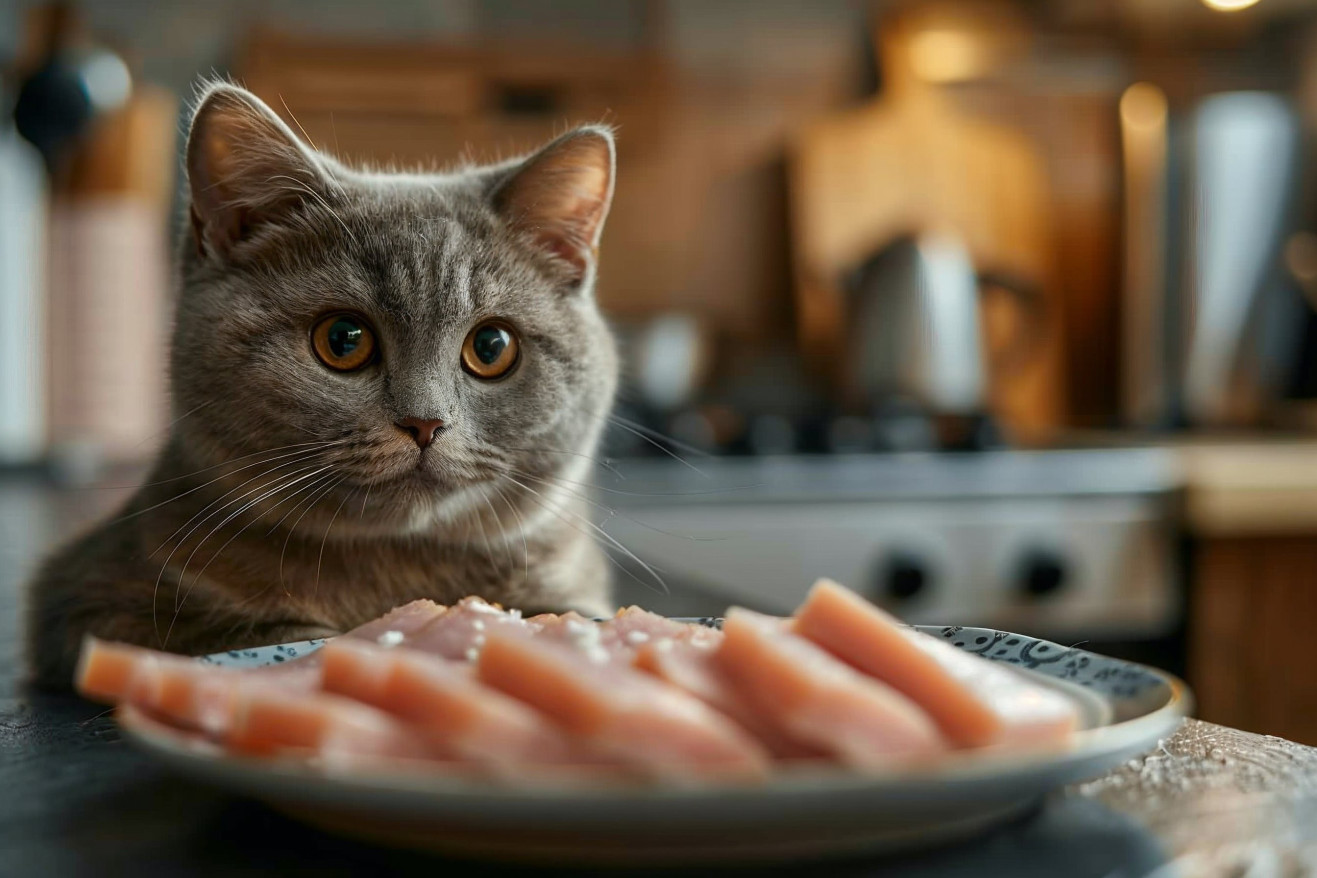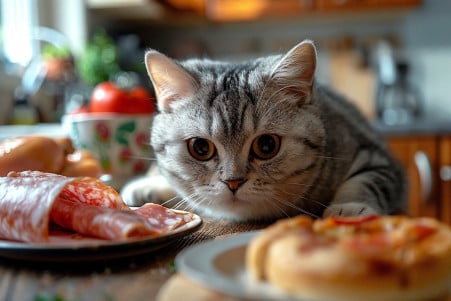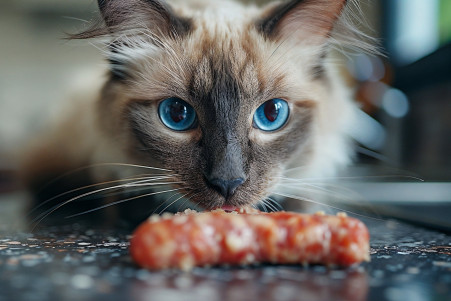Can Cats Eat Spam? Unpacking the Risks of Processed Meats for Felines
24 February 2024 • Updated 24 February 2024

Spam is a popular sandwich ingredient, but is it safe for your cat to eat? The question of whether or not cats can have Spam is a valid one. While not poisonous, Spam is not a good choice for cats because it’s high in fat and sodium. Regularly eating Spam can lead to obesity and other health problems in cats. Always ask a vet before giving your cat human food like Spam.
This article will unpack the nuances of cat nutrition and the potential dangers of processed meats like Spam. We’ll look at information from veterinarians, nutritional research, and the larger context of what cats need in their diet. By looking at reputable sources and expert opinions, we hope to give you a well-rounded view of what your cat’s diet should and shouldn’t include.
Can cats eat spam?
Customizing Nutrition for Your Picky Eater
Since cats are obligate carnivores, they need nutrients that are only found in animal products, so animal-based proteins are an essential part of their diet. According to the Cornell University College of Veterinary Medicine, cats need a diet that is high in protein, moderate in fat, and low in carbohydrates.
This also means that cats need a variety of vitamins, minerals, fatty acids, and amino acids that are not present in plant-based diets in the right amounts. Cats can suffer from health problems and nutritional deficiencies without these nutrients.
When it comes to treats and human food, it’s important to remember that moderation is key. According to VCA Animal Hospitals, while some human food may not be toxic to cats, it should not be a regular part of their diet or given to them in large amounts.
It’s also important for cat owners to make sure that treats only make up a small portion of a cat’s daily caloric intake to prevent weight gain and the health problems that come with it.
Balanced nutrition is important for cats’ health. Not only should the right diet meet the nutritional needs of a cat’s life stage, it should also help prevent obesity, which is a common problem in domestic cats and can lead to a number of serious health issues.
According to VCA Animal Hospitals, too much dietary sodium and fat can be dangerous for cats, so it’s important to make sure that the commercial cat food you choose is nutritionally complete and balanced and doesn’t require additional supplements.
A well-regulated diet can help cats stay healthy and happy in their loving homes.
Salt and Fat: How Cats Can Safely Eat Processed Meats
Cats have to be very careful about the amount of salt in their diet; while they do need some, too much can lead to salt toxicity, which can cause vomiting, diarrhea, and seizures. A review in PubMed found that cats can consume up to 740 mg/MJ metabolizable energy of sodium without any adverse effects. However, going over this amount can disrupt the delicate balance in a cat’s body.
The effects of a high-fat diet are just as important because they can lead to obesity in cats. According to PetMD, fat is an important part of a cat’s diet, especially when it comes to skin and coat health, but it’s important to make sure that they don’t get too much.
Consuming too much fat can lead to a number of long-term health problems, including heart disease and issues with wound healing.
As a result, cats need to eat a balanced diet, not just for their health, but for their survival. A balanced diet will make sure that cats don’t get too much salt and fat, which means avoiding processed foods like Spam that can throw that balance off.
By being mindful of what cats eat, pet parents can help reduce the risk of their cats developing chronic health problems and even start to have a conversation about the role of processed meats in cat nutrition.
Processed Meats and Cats: A Dangerous Mix
While processed meats are a staple of many people’s diets, especially those that are preserved through salting, curing, or the addition of chemical preservatives, they can be especially dangerous when introduced to cats. Litter-Robot Blog explains that these meats are often high in sodium and fat, and contain chemical preservatives, none of which are good for cats.
This is especially true since cats are obligate carnivores, which means their dietary needs are very different from those of humans and processed meats like Spam can lead to health problems like obesity, inflammatory bowel disease, and pancreatitis.
There are a number of dangers that processed meats pose to cats, including the risk of salt poisoning and the fact that they can make existing health problems worse. A diet that’s high in processed meats can throw off a cat’s internal balance and lead to a number of long-term health issues.
Instead, Purina recommends feeding cats cooked salmon, lean turkey, or skinless chicken, all of which are natural sources of protein that don’t come with the high levels of salt and fat that processed meats do.
It’s important to make sure that cats are being fed high-quality commercial cat food that’s formulated to meet their nutritional needs, as it will provide a well-balanced diet that includes all of the necessary nutrients. This will help ensure that cats are healthy and not at risk from the dangers of processed meats.
Navigating Human Foods: What Can Cats Eat?
Cats can be curious about human food, but it’s important to know what’s safe and what’s not to keep your pet healthy. Human food that is safe for cats in moderation includes cooked lean meats like turkey and chicken.
However, as noted by ASPCA Pet Insurance, there are human foods that are toxic to cats, including chocolate, caffeinated drinks, and anything with onions or garlic, which can lead to anemia and gastrointestinal upset. It’s important to keep these foods away from cats and make sure they are stored in a way that prevents cats from accidentally eating them.
It’s best to work with a vet to make sure your cat’s diet is well-balanced and meets their specific nutritional needs. This way, you can make sure your cat is getting the nutrients they need without the dangers of feeding them human food that isn’t safe for them.
In addition, a study published in PMC found that feeding practices have a significant impact on a cat’s psychological and behavioral health. Enrichment feeding practices, such as feeding cats from food puzzles, can help cats stay mentally stimulated and meet their natural foraging needs, which can improve their overall well-being.
Make sure you’re always looking out for your cat’s safety and well-being by making sure you’re feeding them the right diet and seeking out professional veterinary care to help them stay healthy in the long run.
Final Thoughts: Cat Nutrition and the Problem with Spam
In summary, Spam is not a good option for cats because it is highly processed, high in fat, and high in sodium. Since cats are obligate carnivores, they need a diet that is high in animal protein and other nutrients like taurinea critical amino acid that is not found in Spam. Feeding cats processed meats can lead to obesity and nutritional deficiencies, so Spam is not a good option for cats.
Good pet parents are aware of the potential health problems that can be caused by feeding their pets human foods that are high in fat and sodium and are careful to make sure that the food they feed their cats is healthy. Veterinary professionals also stress the importance of feeding pets a balanced diet and making sure that treats are healthy and fed in moderation.
As we work to meet the nutritional needs of our cats, let’s make sure that we are feeding them a healthy, balanced diet of commercial cat food and seeking advice from veterinarians to make sure that our cats’ diets are tailored to their individual needs. This will help ensure that our cats live longer, healthier lives and that we are doing everything we can to keep them healthy.


